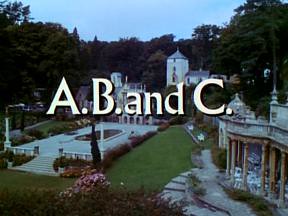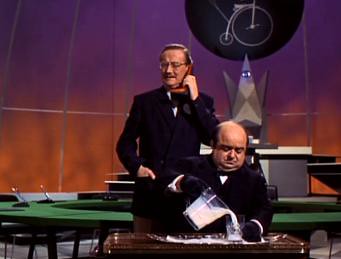
"We all make mistakes...sometimes we have to"
(Revised 01/04/2023)
Look at any information on Colin Gordon, and you'll find that he was a standard, hard-working British actor - in fact, his dual stint as Number 2 on The Prisoner is his major claim to fame. However, his Number 2 is very distinct for several reasons, most notably that his is the closest that comes to figuring out the "why" of Number 6's resignation.
What do we know about this Number 2? He's arrogant towards Number 6 (in the "A, B, & C" pre-episode sequence, boldly announces that "I am Number 2" rather than "I am the new Number 2". However, he is slightly afraid of his superiors - often drinking milk (which he claims is "the perfect food") and looking pensively at the red question-mark-shaped phone on his desk. However, both "A, B & C" and "The General" show that this particular Number 2 is a foreshadowing of one of the major themes of The Prisoner - the use (or misuse) of science and technology.
I had forgotten how fiendishly clever "A, B & C" was as an episode until I watched it again; both foreshadowing character appearances (yes, I know several actors played multiple roles - I like to create my own inner continuity), episodes (such as Number 6 stating "No change of mind," where a later episode will be titled "A Change of Mind"), and contains some sharp directing (notice the A & B sequences, which are straightforward, then the more dreamlike C sequence). Plus, this is the first time a Number 2 has a theory about Number 6's resignation (that the latter was about to "sell out"), rather than a straightforward I-will-break-Number-6 plot. This use of the scientific method suggests that Number 2 is more scientist than spy (and both of these episodes are more science-fiction in tone)
In "A, B & C", we get some very subtle clues about Number 6's pre-Village life. He is a rather restrained yet flirtatious guest who knows people on both sides of the Cold War. By his own admission, he has "never liked secrets", and Number 14 (the female doctor) notices an "anguish pattern" around his resignation. Number 6 has some travel brochures with him and simply states that he plans to go on a post-resignation trip to "Somewhere different, somewhere quiet, somewhere I can think". Given the character assessment in Arrival, I think this is probably the best "theory" as to why Number 6 left his job - he was overworked and needed a break.
But obviously, despite Number 2's "failure" in this regard, he has a much larger - and more important - project to oversee. A project called "Speedlearn". It's stated goal: 100% entry, 100% pass.

"Probably the most important human experiment we've ever had to conduct, and it's treated like a military exercise"
"The General", unfortunately, is not an episode that holds up well upon repeated watching. Many of the themes prevalent - mass indoctrination through media, and lack of critical thinking - are eerily prescient of current times. In addition, we see one symbol - the pallbearer from the beginning credits - explained: it's the "uniform" of the Village equivalent of "civic leaders." It's an episode that, for once, does not focus on Number 6's head - it reveals a slight shift in emphasis. Now, Number 6 makes it his business to destroy the Village internally.
This episode, however, is extremely heavy-handed in handling its theme, its symbolism (Number 12 being "divided" by Number 2 and Number 6?), its attempt at satire, and in drama. In short, it reads like a Rod Serling Twilight Zone pastiche. If they had the budget, Serling could have easily given this a polish between drafts of Planet of the Apes. As it stands, "The General" is not a bad episode per se - it helps us shift towards a broader view of the struggle between Number 6 and the Village. Number 2, as science, sees a device that would have brought about massive influence and achievement of the Village's goals destroyed, even though he sees it as more of a "human experiment". (The fact that the Village sees Speedlearn as "a military exercise reveals much about the malevolence of the powers that be, whether it's "Us", "Them", or "None of the above")
However, the end result is the same - Number 6 has not just defied the Village but has now hurt them. He cannot be ostracized, manipulated, corrupted, or fooled into complying.
From now on, it's no longer a game.
The rules no longer apply.
It's a war between the Village and Number 6.
Coming soon: Number 6 believes in ESP. Number 6 builds a raft. And Number 6 stops a revolution - or does he?
Be seeing you.
What do we know about this Number 2? He's arrogant towards Number 6 (in the "A, B, & C" pre-episode sequence, boldly announces that "I am Number 2" rather than "I am the new Number 2". However, he is slightly afraid of his superiors - often drinking milk (which he claims is "the perfect food") and looking pensively at the red question-mark-shaped phone on his desk. However, both "A, B & C" and "The General" show that this particular Number 2 is a foreshadowing of one of the major themes of The Prisoner - the use (or misuse) of science and technology.
I had forgotten how fiendishly clever "A, B & C" was as an episode until I watched it again; both foreshadowing character appearances (yes, I know several actors played multiple roles - I like to create my own inner continuity), episodes (such as Number 6 stating "No change of mind," where a later episode will be titled "A Change of Mind"), and contains some sharp directing (notice the A & B sequences, which are straightforward, then the more dreamlike C sequence). Plus, this is the first time a Number 2 has a theory about Number 6's resignation (that the latter was about to "sell out"), rather than a straightforward I-will-break-Number-6 plot. This use of the scientific method suggests that Number 2 is more scientist than spy (and both of these episodes are more science-fiction in tone)
In "A, B & C", we get some very subtle clues about Number 6's pre-Village life. He is a rather restrained yet flirtatious guest who knows people on both sides of the Cold War. By his own admission, he has "never liked secrets", and Number 14 (the female doctor) notices an "anguish pattern" around his resignation. Number 6 has some travel brochures with him and simply states that he plans to go on a post-resignation trip to "Somewhere different, somewhere quiet, somewhere I can think". Given the character assessment in Arrival, I think this is probably the best "theory" as to why Number 6 left his job - he was overworked and needed a break.
But obviously, despite Number 2's "failure" in this regard, he has a much larger - and more important - project to oversee. A project called "Speedlearn". It's stated goal: 100% entry, 100% pass.

"Probably the most important human experiment we've ever had to conduct, and it's treated like a military exercise"
"The General", unfortunately, is not an episode that holds up well upon repeated watching. Many of the themes prevalent - mass indoctrination through media, and lack of critical thinking - are eerily prescient of current times. In addition, we see one symbol - the pallbearer from the beginning credits - explained: it's the "uniform" of the Village equivalent of "civic leaders." It's an episode that, for once, does not focus on Number 6's head - it reveals a slight shift in emphasis. Now, Number 6 makes it his business to destroy the Village internally.
This episode, however, is extremely heavy-handed in handling its theme, its symbolism (Number 12 being "divided" by Number 2 and Number 6?), its attempt at satire, and in drama. In short, it reads like a Rod Serling Twilight Zone pastiche. If they had the budget, Serling could have easily given this a polish between drafts of Planet of the Apes. As it stands, "The General" is not a bad episode per se - it helps us shift towards a broader view of the struggle between Number 6 and the Village. Number 2, as science, sees a device that would have brought about massive influence and achievement of the Village's goals destroyed, even though he sees it as more of a "human experiment". (The fact that the Village sees Speedlearn as "a military exercise reveals much about the malevolence of the powers that be, whether it's "Us", "Them", or "None of the above")
However, the end result is the same - Number 6 has not just defied the Village but has now hurt them. He cannot be ostracized, manipulated, corrupted, or fooled into complying.
From now on, it's no longer a game.
The rules no longer apply.
It's a war between the Village and Number 6.
Coming soon: Number 6 believes in ESP. Number 6 builds a raft. And Number 6 stops a revolution - or does he?
Be seeing you.

1 comment:
Excellent as always, my one quibble being that I can't agree with your theory about the reason for the Prisoner's resignation. Watch the man storming through the opening credits, slamming open the doors to George Markstein's office, pacing back and forth as he tears into the poor civil servant verbally, finally slamming his fist down on the desk: this isn't someone fatigued from overwork and peeved because his boss won't give him time off. He may have wanted to go someplace quiet to think things over, but what he needed to think over is the crux of the matter. After careful study of each episode and much thought over the past few decades, it's safe to conclude that the real reason the Prisoner resigned is
Post a Comment